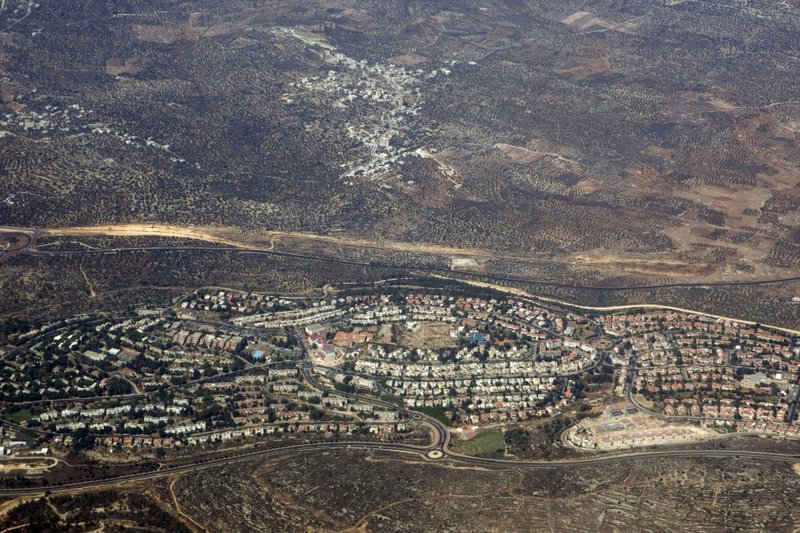JERUSALEM -- Weeks ahead of the expected completion of a U.N. database of companies that operate in Israel's West Bank settlements, Israel is working with President Donald Trump's administration to prevent its publication.
While Israel is usually quick to brush off U.N. criticism, officials say they are taking the so-called blacklist seriously, fearing its publication could have devastating consequences by driving companies away, deterring others from coming and prompting investors to dump shares of Israeli firms. Dozens of major Israeli companies, as well as multinationals that do business in Israel, are expected to appear on the list.
"We will do everything we can to ensure that this list does not see the light of day," Israel's U.N. ambassador, Danny Danon, said.
The U.N.'s top human-rights body, the Human Rights Council, ordered the compilation of the database in March 2016, calling on U.N. rights chief Zeid Ra'ad al-Hussein to "investigate the implications of the Israeli settlements on Palestinians."
The international community overwhelmingly considers the settlements, built on occupied land claimed by the Palestinians for a future state, to be illegal. Israel rejects such claims, citing the land's strategic and religious significance, and says the matter should be resolved in negotiations.
Israeli officials say that about 100 local companies that operate in the West Bank and east Jerusalem have received warning letters that they will be on the list. In addition, some 50 international companies, mostly American and European, also have been warned.
The companies have not been publicly identified, but one official said they include Israeli banks, supermarkets, restaurant chains, bus lines and security firms, as well as international giants that provide equipment or services used to build or maintain settlements. He spoke on condition of anonymity because he was not authorized to discuss the matter with the media.
The only company to confirm receiving a warning letter has been Bezeq, Israel's national telephone company. Bezeq's chief executive, Stella Handler, posted a copy of the letter sent by Zeid's office in September on her Facebook page. It accused Bezeq of using West Bank land for infrastructure, providing phone and Internet services to settlements and operating sales offices in the West Bank and east Jerusalem.
Handler angrily wrote that Bezeq provides service to all customers, regardless of race or where they live.
"The council's bias against Israel is so extreme that it has lost all relevance in the world," she wrote. "We will not cooperate with a move that is all in all anti-Israeli propaganda."
But hours later, Handler removed the post, saying she had done so at the request of the government. The Israeli official confirmed the government has asked companies not to speak about the issue. Bezeq declined comment.
Israel has long accused the United Nations, and particularly the rights council, of being biased against it.
Israel is the only country that faces an examination of its rights record at each of the council's three sessions each year. Some 70 resolutions, or about quarter of the council's country-specific resolutions, have been aimed at Israel. That is nearly triple the number for the second-place country: Syria, where hundreds of thousands have been killed in a devastating six-year civil war.
Israeli leaders and many nongovernmental groups also complain that some of the world's worst violators of human rights, including Venezuela, Saudi Arabia, Congo and Cuba, sit on the council.
Some Western diplomats have said the database could set a harmful precedent by blurring the line between business and human rights on issues that are better left to trade policy than the Geneva council.
Israel seems to have little leverage over the council. But its campaign has received a big boost from the United States. The Trump administration has taken a tough line against the U.N., demanding changes and, in October, withdrawing from the cultural agency UNESCO because of what it called anti-Israel bias.
In a speech to the council in June, U.S. Ambassador Nikki Haley railed against its makeup and demanded that Israel be removed as a permanent fixture on its agenda. She also hinted that the U.S. could quit the council.
The upcoming release of the database could test that commitment. It has triggered a quiet, but high-stakes effort by Israel and the U.S. to try to block its release.
"We just view that type of blacklist as counterproductive," State Department spokesman Heather Nauert said recently.
But Nabil Shaath, a senior Palestinian official, said the list is an "important step" in moving from verbal condemnation to practical action against the settlements. He expressed hope that it would lead companies to stop doing business with the settlements and even lead to sanctions against those that continue.
Information for this article was contributed by Jamey Keaten of The Associated Press.
A Section on 11/27/2017

